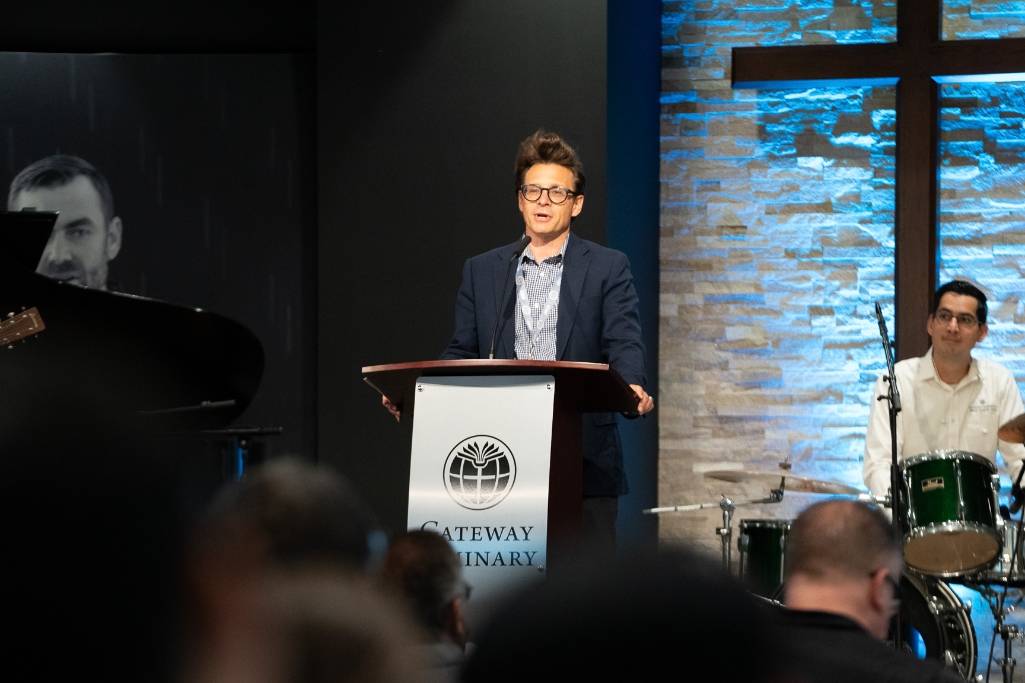
Adam Groza, president of Gateway Seminary, speaks during the first chapel of the fall 2025 semester.
ONTARIO, Calif. — During the first chapel of the fall 2025 semester, Gateway Seminary President Adam Groza preached on the need for sound doctrine to fulfill the Great Commission.
Groza cited the 100th anniversary of the Baptist Faith and Message while articulating the history of Gateway’s confessional founding. Established in 1944, the board of trustees adopted the 1833 New Hampshire Confession of Faith in 1950. In 1956, it adopted the Baptist Faith and Message, which remains its official doctrinal statement.
“From the very beginning of our seminary, our predecessors knew that in order to faithfully shape leaders who expand God’s kingdom around the world, we would need a foundation of sound doctrine upon which to shape those leaders,” Groza said.
Groza shared a statement from the 1946 inaugural address of Gateway’s second president, Benjamin Herring, about the importance of doctrinal convictions.
“Herring said that a confession functions like a wheel propelling the progress of the kingdom of God,” Groza said.
“Our mission is shaping leaders who expand God’s kingdom around the world, and our first value as a seminary is that we are, and we will be, biblical.”
Groza continued his sermon with a survey of biblical calls to sound doctrine and to the benefits of sound doctrine. He referred to Paul’s call to teach according to sound doctrine in Titus 2:1 and 1 Timothy 4:1-5 and 6:3-4. Then Groza pointed to Matthew 28:19-20, where sound doctrine is explicitly connected to the Great Commission.
“Teaching sound doctrine is an essential component of the Great Commission. It is not a distraction from the Great Commission; it is the Great Commission.”
He pointed out the relationship between one’s life and sound doctrine in 1 Timothy 4:16.
“In ministry, Paul says keep your eye on sound doctrine and on your character,” he said.
“The result of sound doctrine is life. … It is life for you and it is life for your hearers.”
Ultimately, a commitment to sound doctrine is an act of love, Groza said.
“As Jesus said to Peter in John 21, we demonstrate our love for Jesus by feeding His sheep the sound doctrine of God’s Word.”
Conversely, false teaching is caustic. Teachers who have separated from sound doctrine teach that which is “destructive.” It “erodes the unity of the faith.” he said.
“Sound doctrine keeps us from false doctrine, it unifies God’s people, it produces more love for God, more love for neighbor, more unity, more holiness, more evangelism and more missions.”
Groza shared a quote from Tim Keller’s sermon “Sound Doctrine” regarding the pursuit of peace. The worldly option is to avoid thinking too hard in pursuit of peace, but the Christian pursues peace by “thinking very hard, and learning, grasping, rejoicing in, and resting in” God’s truth.
“That is what we want for ourselves, and that is what we want for the world,” Groza said.
“And from that (pursuit), to love others enough to teach them to trust and obey all that Christ has commanded. In sound doctrine, the Great Commission and the great commandment come together.
“Sound doctrine for kingdom advancement — we are called to it, we commit ourselves to it, and God is glorified by it,” Groza said.


